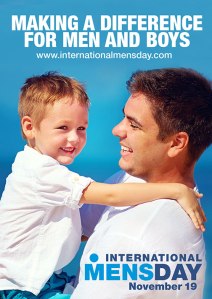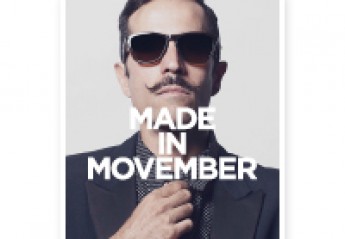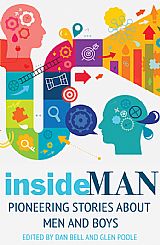It’s absolutely boss being a father. It’s the best things that’s happened to me. It’s also boss having a boy. Not that his sex makes much of a difference so far (he’s almost two) and we don’t bring him up in an anti-dolly pro-car mentality, but still, he’s a boy, and he’s ace.
We have a lot of fun, him and me. He can imitate the sounds made by magpies, blue tits, pigeons, hoopoes and cuckoos. He made up his first song last week which went as follows: “Gold Goldfinch. Sparrow sparrow. Mag Magpie”. He shouts “Iron Maiden!” when I play them. He kisses my icons. He prefers cake to soup. He loves our daily session of “intense physical contact” which involves him clambering about on me, a bit of tickling and him trying out his strength such as through a headbutt last week; I still have the scar.
- Perhaps you can see the scar at the top of my nose
He’s ace and he likes being with me.
By the time I was my boy’s ace, my father was too sick to do strenuous stuff with me. By the end of my second year he was in hospital a lot, and when I was three he died.
This and what I experience with my boy has shown me the political dimension of a father/son relationship, in that I, by not having one, lack privileges that many have:
(1) Less money as a child as no father was there to earn money. This pushed me into the underclass by being a welfare recipient as a child.
(2) The lack of protection living on a rough street.
(3) The lack of guidance of what it means to be a man. At the very least, people who don’t like what their fathers are like are react against something. I had nothing.
(4) Feeling strange, as I was the only one I knew without two parents. This “otherness” has remained with me all my life.
(5) Not being exposed to a work culture, something that later to have the consequence of me finding it difficult to find work and left me unemployed for over two years after graduating.
(6) Together with the fact that I was born to migrants, I have a less of rootlessness.
(7) People with fathers don’t have the awkwardness that comes with not having one when it gets thematised, the stress on Fathers’ Day; the annoying shows of pity, which annoyed me when I was a boy.
(8) It isn’t an obvious hindrance in life and isn’t visible, therefore there aren’t many associations/groups for us. You don’t see “fatherless” sections in newspapers.
(9) The skills that one can learn from a father, whatever they may be (mine could do woodwork) don’t get passed on. Consequently I need to “get a man in” to sort out various DIY things.
(10) The loss of someone so key to ones own being, to ones own sex, can give a sense of passivity in the sense of bigger things installed into the deepest depths of the psyche; issues can seem so big, things like having a career. For this reason, I had to fight for years to get over this. I am still not career-focused.
It’s not all bad, like! I have a strong sense of independence that has stood me in good stead, having the effect that I stubbornly push forward things when I know I am right, for indeed, I am sometimes right. Conversely, by being exposed as a child towards not having to be self-sufficient (people in my church helped us a lot) the values of solidarity have become ingrained within me. At the same time, Intersectionality shows that I have privileges as well as lack of privileges in the different sections of my being. Being white, heterosexual and cisgender brings me many privileges in many ways, for example.
Of course, some may say that having a father wasn’t always a positive. Abusive fathers exist. I can get it that some would prefer not to have had one. At the same time, looking from the outside, I can say that, if you look at the list of privileges that I don’t have, perhaps you can, if you are someone who would prefer to not have had contact with your father, consider which of those privileges you have.
I also appreciate that some of you who were only brought up with your mothers may be very proud of her. Not all fatherless boys have these problems. It is very hard to bring up a child alone and I respect those who do so.
Saying that, a look at various statistics shows that fatherless children are more likely to be in poverty, by drug and/or alcohol dependent, have behavioural problems (by altering the prefrontal cortex of the brain), have educational success, get into crime, commit suicide, have problems socialising with others, tolerate abuse done to them and have anger issues. When one considers that, worldwide, men are much more likely to commit suicide and in the EU, become homeless, one can see that being fatherless is indeed a political issue, especially in the light of an increase in divorce rates, the worldwide death of fathers during war and the separation of fathers from their sons due to the father becoming a refugee.
Who (doesn’t) thematise this?
For a while I was a member of a men’s page on Facebook that largely contained members who live in the US. Many were concerned about parental alienation due to not have custody of their children. Unfortunately, many became embittered through this and rage at “feminists” and “political correctness”. Criticism of conservative gender roles and what capitalism has done to them were however not themes that they were happy about. Due to the picture many of them had about women, feminists and politics, I have to leave that group.
At the same time, in the UK, I note that attempts by men and women to discuss such issues face mocking and attempts to stop them from being able to talk with each other by womens’ groups. It’s like vulnerable men are faced with the pincer movement of being told to “man up” by conservative men, and to “stop whining and listen to our problems” by some feminists; both have the same effect of swallowing ones problems. In the light of the aforementioned disproportional suicide rates for men, one can wonder how such actions help. Mocking articles by university-educated people demonstrate both the political issue of fatherlessness (due to our on average lower levels of education) and class (that we are more likely to be in poverty) in that we don’t have a voice in the mainstream media, a voice that more privileged people have.
The tide is turning
Thankfully, over the past two years there is a growing international movement comprising of men and women, including feminists, that addresses men’s issues. In the UK, there is insideMAN, an online magazine Their excellent book “Pioneering stories about men and boys” addresses many of the issues I’ve mentioned here and more in a way that shows the diversity of opinions that those who work for mens’ issues have, both pro- and anti-feminism. The growing International Men’s Day (November 19) is also a sign that these issues are being slowly addressed. A whole range of NGOs have been founded that deal with issues like fatherhood, male victims of child abuse and domestic violence, genital mutilation, prostrate and testicular cancer, mental health, being gay and behavioural issues. More and more men’s workshops are happening (I myself have been doing them for five years now, with some success!).

The success of Movember (feel free to sponsor me!), now internationally well known is another example of how men and women are working together for the good of those boys and men who face a lack of privileges in various areas of their lives. In doing so, they are not just focusing on problems that men face, also on the joys of being a man, the joys of having children.
It is on this note that I wish to end: It’s utterly ace to have my boy in my life. I have never been so happy and fulfilled. Through the changing male gender roles and increase in the thematisation of men’s themes, his life and that of his future friends and family is being helped.


